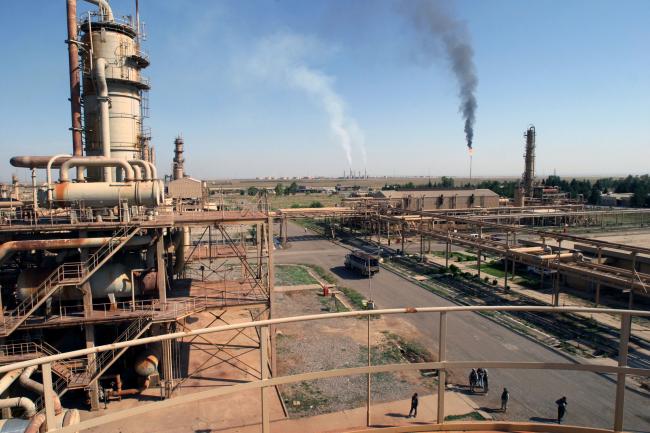(Bloomberg) -- Iraqi forces advanced toward the disputed city of Kirkuk, as the government sharply intensified its efforts to stall moves toward a Kurdish state by seizing the oil fields that would underpin its economy. Crude exports from the disputed area were flowing normally on Monday.
State-run Iraqiya television said the military had also captured a refinery, a gas plant and a main road in Kirkuk, which has emerged as a flashpoint in the power struggle between the federal government in Baghdad and the Kurdistan Regional Government. The Associated Press reported that Kurdish fighters had abandoned their positions outside Kirkuk’s airport while civilians were fleeing the city, where sporadic gunfire could be heard.
The military offensive, which Iraqi Prime Minister Haider al-Abadi had vowed to avoid, follows three weeks of escalating tensions since the Kurds voted overwhelmingly in favor of statehood on Sept. 25. Iran and Turkey, both with their own restive Kurdish minorities, led regional opposition to the referendum and on Monday, Turkey’s foreign ministry issued a statement stressing the need for Iraqi unity.
It remains unclear how far Iraq’s army and its militia partners intend to advance, but the importance of Kirkuk and the complexity of the armed alliances increase the “potential for political and military miscalculations,” said Glen Ransom, Iraq analyst at Control Risks in Dubai. “The U.S. will try to de-escalate the situation to avoid compromising anti-Islamic State operations,” he said. That could lead to agreements on Kurdish withdrawals from some areas and potentially joint administration, he added.
OPEC Producer
There were conflicting reports as the Iraqi campaign began on Sunday. State television reported that Abadi had ordered Iraqi forces to impose security in Kirkuk in cooperation with Kurdish peshmerga forces, adding that government troops had captured areas in the city without a fight. The Kurdish Rudaw news service said at least seven Iraqi militiamen were killed south of Kirkuk, citing an unidentified peshmerga commander.
Iraq is the second-largest producer within the Organization of Petroleum Exporting Countries, pumping most of its 4.47 million barrels a day from fields in the south and shipping it from the Persian Gulf port of Basra. But with Iraq supplying about 14 percent of total OPEC production, a conflict centered in the country’s north could have an immediate impact on oil markets.
Kirkuk’s oil fields and deposits inside the adjacent Kurdish region were exporting about 600,000 barrels a day through a Kurd-controlled pipeline to Turkey, according to a person familiar with the matter, asking not to be identified because the information is private. The KRG included Kirkuk in the vote, despite competing territorial claims to the area.
Eurasia Group estimates that Iraq taking control in Kirkuk could cut shipments by 450,000 barrels daily until the federal government repairs its own disused pipeline to Turkey or reaches a revenue-sharing deal with the Kurds.
While there was no halt to oil exports in the early stage of the military advance, the potential for disruptions sent Brent crude as much as 1.7 percent higher to $57.84 a barrel in London. The benchmark gained 2.8 percent last week.
Underscoring the potential for a regional spillover, Abadi’s office had late on Sunday accused the Kurds of deploying militants from the Turkish PKK organization, saying that was considered a declaration of war against Iraq.
The PKK has been battling for independence for Turkey’s Kurds for more than three decades, and authorities in Ankara fear Kurdish gains in Iraq and neighboring Syria could fuel further violence at home.
Kurdish Gains in Mideast Chaos Fuel Statehood Dream: QuickTake
The latest dispute between Baghdad and the KRG over the Kirkuk area flared after their combined forces routed Islamic State militants from most of northern Iraq earlier this year. Kurdish forces occupied much of Kirkuk province in June 2014 after Iraqi troops retreated ahead of the then-advancing militants. Baghdad refuses to recognize Kurdish control of the area.
“The war on ISIS is edging to an end and now the real war starts, the war between the regional powers in order to control resources and define their own areas of influence,” said Sami Nader, head of the Levant Institute for Strategic Affairs in Beirut. What’s happening in Kirkuk is not just a local Iraqi conflict but a regional race to establish new boundaries, he said.
